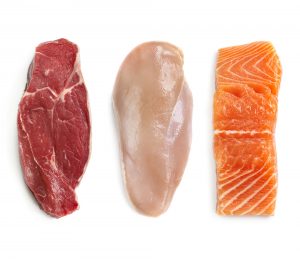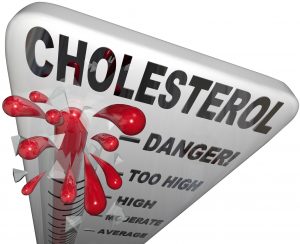The Lies of the Beef Industry
 Last week I wrote about a recent review claiming that the evidence for the health risks of red meat consumption was so weak that the best advice for the American public was to eat as much of it as they like. I pointed out the many flaws in that study.
Last week I wrote about a recent review claiming that the evidence for the health risks of red meat consumption was so weak that the best advice for the American public was to eat as much of it as they like. I pointed out the many flaws in that study.
- One of the flaws was that the review discounted dozens of association studies showing a link between red meat consumption and disease and relied instead on randomized controlled trials. Normally, that would be a good thing, but…
- The association studies looked at health outcomes and had hundreds of thousands of participants. They found clear links between red meat consumption and increased risk of heart disease and cancer.
- The randomized controlled trials looked at blood parameters like LDL cholesterol and averaged less than 500 participants. These studies were too small to provide meaningful results, and, not surprisingly, the results were conflicting. Some linked red meat consumption to increased risk, while others did not.
Because they had discounted evidence from association studies, the authors of the review concluded that the overall evidence was weak.
This week I want to address why the evidence from randomized controlled trials for health risks of red meat is so weak. More importantly, I want to highlight the role of the beef industry in making sure the evidence on the health risks of red meat consumption is weak.
I will also point out the role of the media in this process because they are equally complicit in spreading misleading information about the health risks of red meat consumption.
You might be asking: “How does the beef industry influence clinical trials to produce outcomes supporting their message that red meat is perfectly healthy?” “Surely they can’t convince reputable scientists to falsify their results.”
- The answer is they don’t need to convince scientists to falsify their results. They just need to influence the design of the experiments so the results will be to their liking.” I will give two examples of that in this article.
Next you might be wondering: “What is the role of the media in this? Surely they just report what the scientific publication says.” Don’t be deceived. The media isn’t interested in accuracy. They are interested in generating the largest possible audience. They know controversy attracts an audience. They are looking for “man bites dog” headlines even if it isn’t true.
- If you actually read the studies, you discover that reputable scientists always discuss the weaknesses and flaws in their study. The media either doesn’t read the publication or ignores the weaknesses. Instead they focus on the most controversial headline they can craft. I will give some examples of that as well.
Is Red Meat As Healthy As White Meat?
 For years we have been told that red meat increases our risk of heart disease because it is high in saturated fats. We’ve been told that white meat and plant proteins are better alternatives.
For years we have been told that red meat increases our risk of heart disease because it is high in saturated fats. We’ve been told that white meat and plant proteins are better alternatives.
But the latest headlines claim that red meat is just as heart healthy as white meat. You are probably wondering what to believe. Let’s examine the study behind the headline and ask two important questions?
- Did the beef industry influence the study?
- Did the media distort the study in their reporting?
I will start by reporting the study design and the results of the studies without comment. Then I will discuss how the beef industry influenced the design of the study to produce misleading results.
The Headlines Said: “Red Meat and White Meat Are Equally Heart Healthy.” The study behind the headlines was a 4-week study (N Bergeron et al, American Journal of Clinical Nutrition, 110: 24-33, 2019) comparing equivalent amounts of red meat, white meat, and non-meat protein on LDL levels. It did report that red meat and white meat raised LDL cholesterol levels to the same extent, but here is what the headlines didn’t tell you:
- The authors of this study are heavily funded by the dairy and beef industries. I will point out the implications of this funding below.
- 4 weeks is a very short time. This study provides no information on the long-term effects of red meat versus white meat consumption.
- The study only measured LDL and related lipoproteins. It did not measure heart disease outcomes. LDL and lipoprotein levels are only one indicator of heart disease risk. Thus, they are imperfect predictors of heart disease risk. I will point out why that is important below as well.
- The study was performed at two levels of saturated fat – low (7% of calories) and high (14% of calories).
At the low level of saturated fat, only the leanest cuts of red meat (top round and top sirloin) were used to keep saturated fat low in the red meat group. High fat dairy foods were added to the non-meat protein group to increase saturated fat content. Thus, all 3 groups consumed the same amount of saturated fat.
At the high level of saturated fat, butter and high-fat dairy foods were added to the white meat and non-meat protein groups to increase saturated fat content. Once again, saturated fat content was identical in all 3 groups.
- LDL and related lipoproteins were higher for the high saturated fat group than the low saturated fat group. Nothing new here. This is consistent with dozens of previous studies. We know that saturated fat increases LDL cholesterol levels when other aspects of the diet are kept constant.
- In both the low and high saturated fat groups, red and white meat raised LDL cholesterol to the same extent. In other words, when saturated fat levels are held constant, red meat and white meat raise cholesterol levels to the same extent.
In interpreting that statement, you need to remember the study design.
-
- In the low saturated fat group, only two cuts of red meat were low enough in saturated fat for a direct comparison to white meat.
-
- In the high saturated fat group, butter and high fat dairy had to be added to white meat so it could be compared to red meat.
Obviously, this is not the real world. 95% of the red meat the average American consumes is higher in saturated fat than most white meat.
 The authors concluded “The findings…based on lipid and lipoprotein effects, do not provide evidence for choosing white over red meat for reducing heart disease risk”. That conclusion is clearly inaccurate.
The authors concluded “The findings…based on lipid and lipoprotein effects, do not provide evidence for choosing white over red meat for reducing heart disease risk”. That conclusion is clearly inaccurate.
- The study did not measure heart disease outcomes. It measured only LDL cholesterol and related lipoprotein levels. That is just one factor in determining heart disease risk. The significance of that statement will be explained below.
- Red meat and white meat raised LDL cholesterol levels to the same extent only when saturated fat is held constant. We know that most red meat is higher in saturated fat than white meat and saturated fat raises LDL cholesterol levels. In fact, the study confirmed that the high-fat red meats most people consume raised LDL cholesterol more than white meats.
- The accurate conclusion to this study would have been: “Most red meat raises LDL cholesterol more than white meat, which suggests red meat may increase heart disease risk compared to white meat.”
- Did I mention that the authors are heavily funded by the beef industry?
What About TMAO And Heart Disease Risk?
 Interestingly, the authors also looked at another risk factor for heart disease in the same study, something called TMAO. I have discussed the relationship between red meat, TMAO, and heart disease risk in a previous issue of “Health Tips From the Professor”).
Interestingly, the authors also looked at another risk factor for heart disease in the same study, something called TMAO. I have discussed the relationship between red meat, TMAO, and heart disease risk in a previous issue of “Health Tips From the Professor”).
Let me summarize briefly here:
- Red meat has 10-50-fold higher concentrations of a compound called L-carnitine than white meat.
- Meat eaters have a very different population of gut bacteria than people who eat a primarily plant-based diet. It is not clear whether that is due to the meat or the loss of plant foods that meat displaces from the diet.
- The gut bacteria of meat eaters convert L-carnitine to trimethylamine (TMA), which the liver then converts to trimethylamine N-oxide (TMAO).
- The gut bacteria of people consuming a primarily plant-based do not convert L-carnitine to TMA, so no TMAO is formed. For example, in one study investigators fed an 8-ounce sirloin steak to meat eaters and to vegetarians. The meat eaters ended up with high levels of TMAO in their blood. The vegetarians had little or no TMAO in their blood.
- High levels of TMAO are associated with atherosclerosis, increased risk of heart attacks, and death. Therefore, TMAO is considered an independent risk factor for heart disease.
The authors of the study comparing red meat and white meat also found that blood TMAO levels were two-fold higher in the red meat group than in the other two groups and this was independent of dietary saturated fat. However, rather than publishing this in the same paper where it might have interfered with their message that red and white meat affect heart disease risk to the same extent, the authors chose to publish these data in a separate paper (Z.Wang, European Heart Journal, 40: 7: 583-594, 2018).
Did I mention the authors are heavily funded by the beef industry?
Is Red Meat Healthy As Part Of A Mediterranean Diet?
 Let me briefly touch on one other study funded by the beef industry. The headlines said: “You may not have to give up red meat. It is healthy as part of a Mediterranean diet.”
Let me briefly touch on one other study funded by the beef industry. The headlines said: “You may not have to give up red meat. It is healthy as part of a Mediterranean diet.”
The study (LE O’Connor et al, American Journal of Clinical Nutrition, 108: 33-40, 2018) behind the headlines did report that lean beef and pork did not raise LDL cholesterol levels when they were included in a Mediterranean diet. However, it is important to look at what the headlines didn’t tell you.
- The red meat group consumed only 2.4 ounces of red meat a day. We aren’t talking about 8-ounce steaks or a rack of pork ribs here.
- The red meat group ate only the very leanest (tenderloin) cuts of beef or pork.
- On a positive note, while it wasn’t measured in this study, it is likely that TMAO levels would be relatively low because the subjects were consuming a primarily plant-based diet. They were consuming 7 servings of vegetables, 4 servings of fruit, and 4 servings of whole grains each day.
- Similarly, red meat has several components that appear to increase cancer risk. However, they can be largely neutralized by various plant foods. This is something I have discussed in more detail in my book “Slaying The Food Myths”.
In summary, it would have been more accurate to conclude that very small, very lean servings of red meat may be healthy as part of a primarily plant-based diet like the Mediterranean diet.
The Lies Of The Beef Industry
 Both these studies utilized the very leanest cuts of red meat so they could conclude that red meat is healthy. This is a common design of studies funded by the beef industry. Rather than looking at the health effects of the high fat red meats most people consume, the studies focus only on the leanest cuts of meat.
Both these studies utilized the very leanest cuts of red meat so they could conclude that red meat is healthy. This is a common design of studies funded by the beef industry. Rather than looking at the health effects of the high fat red meats most people consume, the studies focus only on the leanest cuts of meat.
The studies appear to be designed to purposely mislead the American public. Let’s look at how that happens. When studies like these are incorporated into larger meta-analyses or reviews, investigators often look at the conclusions, not at the experimental design.
Meta-analyses and reviews are only as good as the studies they include, a concept referred to as “Garbage in – Garbage Out”. That is what happened with the review and recommendations I discussed last week. The review relied heavily on short-term randomized controlled trials.
However, this is problematic. Because of the way they are designed, industry funded studies tend to find no adverse effects of consuming red meat. Independently funded studies tend to find adverse health effects from red meat. If you throw them all together without considering how the experiments were designed, the studies cancel each other out.
On that basis the authors of the review concluded that the evidence for red meat adversely affecting health outcomes was weak and recommended that everyone could continue consuming red meat. (That is a recommendation that virtually every health organization and top expert in the field have rejected for the reasons I summarized last week).
The beef industry doesn’t have to influence the design of every study, just enough studies to confuse the science and confuse the media.
The Complicity Of The Media
 Unfortunately, the media is equally guilty of misleading the public. As I said above, the media is interested in attracting an audience, not in accuracy. For example:
Unfortunately, the media is equally guilty of misleading the public. As I said above, the media is interested in attracting an audience, not in accuracy. For example:
- The headlines describing the first study should have said: “Saturated fat raises LDL cholesterol levels”. But everyone knows that. Headlines like that are non-controversial. They don’t attract readers.
- The headlines describing that study could have said: “Very lean cuts of red meat don’t raise LDL levels any more than white meat”. That would have been accurate, but that wouldn’t attract readers either. Most Americans prefer high fat cuts of red meat. They aren’t interested in reading articles suggesting they should change what they are eating.
- Similarly, the headlines describing the second study should have said: “Very small amounts of very lean red meat may be healthy as part of a Mediterranean diet.”
- In fact, the authors of both studies admitted in their discussions that they could not extrapolate their findings to the effects of higher-fat red meats. The media ignored those statements. Presumably, they decided the American public didn’t want to hear that message.
- The first study also found that LDL and related lipoprotein levels were lower for the non-meat protein group than the red and white meat groups at both saturated fat levels. In fact, the main conclusion of the authors was: “The findings are in keeping with recommendations promoting diets with a high proportion of plant foods.” Somehow the media completely ignored that finding.
When the media consistently misleads the public about what constitutes a healthy diet, it leads to confusion. Confusion leads to inaction. At a time when so many Americans are suffering from preventable diseases, this is inexcusable.
Is Red Meat Healthy?
 Let’s return to the question I posed last week: “Is red meat healthy?” Most of what I say below is identical to what I said last week. However, with the information I provided in the article above it may be easier to understand.
Let’s return to the question I posed last week: “Is red meat healthy?” Most of what I say below is identical to what I said last week. However, with the information I provided in the article above it may be easier to understand.
- The saturated fat in red meat is associated with increased heart disease risk.
- Red meat increases blood levels of TMAO, which is associated with increased heart disease risk.
- The heme iron in red meat can be converted in the gut to N-nitroso compounds, which are associated with increased risk of cancer.
- Benzopyrene and heterocyclic amines are formed when red meat is cooked. And they are associated with increased risk of cancer.
As I said last week, “There are too many studies that show a strong association between red meat consumption and disease risk to give red meat a clean bill of health. We can’t say red meat is healthy with any confidence.”
However, that doesn’t mean we need to eliminate red meat from our diet. As described above, the health risks of red meat are determined by the type of red meat consumed, the amount of red meat consumed, and the overall composition of our diet. For example:
- Very lean cuts of red meat contain no more saturated fat than white meat.
- Primarily plant-based diets alter our gut bacteria in such a way that production of TMAO and N-nitroso compounds are decreased.
- Diets high in plant fiber sweep benzopyrene and heterocyclic amines out of our intestine before they can cause much damage.
So, what does that mean to you?
- If you are thinking in terms of a juicy 8-ounce steak with a baked potato and sour cream, red meat may increase your risk of disease.
- However, if you are thinking of 2-3 ounces of very lean steak in a vegetable stir fry or a green salad, red meat is probably OK.
- If you are thinking about the very leanest cuts of red meat, they are probably just as healthy as white meat.
What About Grass Fed Beef?
Of course, one question I am frequently asked is: “What about grass fed beef? Is it healthier than conventionally raised beef?” Grass fed beef does have a slightly healthier fat profile. It is modestly lower in saturated fat and modestly higher in omega-3 fats. However, grass feeding doesn’t affect TMAO, N-Nitroso, benzopyrene, and heterocyclic amine formation.
- That means the 8-ounce steak is only slightly less unhealthy and the 2-3 ounces of steak in a green salad only slightly healthier when you substitute grass-fed for conventionally raised beef. It’s probably not worth the extra cost.
Next week I will return with the answer to another question I get a lot. “If plant protein is good for me, what about all those meatless burgers that are popping up in my favorite fast food restaurants. Are they healthy?”
The Bottom Line
Last week I wrote about a recent review claiming that the evidence for the health risks of red meat consumption was so weak that the best advice for the American public was to eat as much of it as they like. I pointed out the many flaws in that study.
This week I provided two examples of how the beef industry influences the design of clinical trials to minimize the health risks of red meat and the media misleads the public about what the studies showed.
The bottom line is that red meat likely has no adverse health effects only if you are consuming very small amounts of very lean red meat in the context of a primarily plant-based diet. Unfortunately, this is not the message you are getting from the media and from Dr. Strangelove’s health blog.
As for grass-fed beef, it is only modestly healthier than conventionally raised beef for reasons I have given in the article above. It’s probably not worth the extra cost.
Next week I will return with the answer to another question I get a lot. “If plant protein is good for me, what about all those plant-based burgers that are popping up in my favorite fast food restaurants. Are they healthy?” Stay tuned.
For more details, read the article above.
These statements have not been evaluated by the Food and Drug Administration. This information is not intended to diagnose, treat, cure or prevent any disease.













